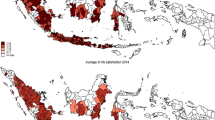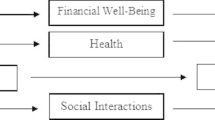Abstract
Most of the research on happiness has documented that income, marriage, employment and health affect happiness. Very few studies examine whether happiness itself affect income, marriage, employment and health. This study does so, benefiting from data drawn from the panel longitudinal Indonesian Family Life Survey (IFLS) 2007 and 2014. The survey includes 23,776 individuals from 15,067 households living in about 262 neighborhoods between 2007 and 2014. The findings show that happier Indonesians in 2007 earned more money, were more likely to be married, were less likely to be divorced or unemployed, and were in better health when the survey was conducted again seven years later. Policy makers may consider that increasing citizen happiness is vital to achieve citizen success on labor markets, to improve their job performance and to maintain their health.
Similar content being viewed by others
References
Akita, T., & Miyata, S. (2018). Spatial inequalities in Indonesia, 1996–2010: A hierarchical decomposition analysis. Social Indicators Research, 138(3), 829–852.
Andersson, P. (2008). Happiness and health: Well-being among the self-employed. The Journal of Socio-Economics, 37(1), 213–236.
Andresen, E. M., Malmgren, J. A., Carter, W. B., & Patrick, D. L. (1994). Screening for depression in well older adults: Evaluation of a short form of the CES-D. American Journal of Preventive Medicine, 10(2), 77–84.
Argyle, M. (1997). Is happiness a cause of health? Psychology and Health, 12(6), 769–781.
Argyle, M. (2003). Causes and correlates of happiness. In Kahneman et al., (Eds.), Well-Being: The Foundations of Hedonic Psychology. New York USA: Russell Sage Foundation.
Ball, R., & Chernova, K. (2008). Absolute income, relative income, and happiness. Social Indicators Research, 88(3), 497–529.
Boehm, J. K., & Lyubomirsky, S. (2008). Does happiness promote career success? Journal of Career Assessment, 16(1), 101–116.
Bowen, J. R. (1986). On the political construction of tradition: Gotong Royong in Indonesia. The Journal of Asian Studies, 45(3), 545–561.
BPS. (2017). Regional economic development in Indonesia. Jakarta Indonesia: BPS.
Carr, A. (2013). Positive psychology: The science of happiness and human strengths: London UK: Routledge.
Cheng, H., & Furnham, A. (2003). Personality, self-esteem, and demographic predictions of happiness and depression. Personality and Individual Differences, 34(6), 921–942.
Clark, A. E., Frijters, P., & Shields, M. A. (2006). Income and happiness: Evidence, explanations and economic implications. Paris: Paris-Jourdan Sciences Economiques.
Cohn, M. A., Fredrickson, B. L., Brown, S. L., Mikels, J. A., & Conway, A. M. (2009). Happiness unpacked: Positive emotions increase life satisfaction by building resilience. Emotion, 9(3), 361.
Compton, W. C., & Hoffman, E. (2019). Positive psychology: The science of happiness and flourishing. Bellmonth California USA: SAGE Publications.
Dabla-Norris, M. E., Kochhar, M. K., Suphaphiphat, M. N., Ricka, M. F., & Tsounta, E. (2015). Causes and consequences of income inequality: A global perspective: New York USA: International Monetary Fund.
De Neve, J.-E., & Oswald, A. J. (2012). Estimating the influence of life satisfaction and positive affect on later income using sibling fixed effects. Proceedings of the National Academy of Sciences, 109(49), 19953–19958.
Deaton, A., & Zaidi, S. (2002). Guidelines for constructing consumption aggregates for welfare analysis (Vol. 135). Washington DC USA: World Bank Publications.
Duesenberry, J. S. (1949). Income, saving, and the theory of consumer behavior. Cambridge USA: Harvard University Press.
Easterlin, R. A. (2001). Income and happiness: Towards a unified theory. The Economic Journal, 111(473), 465–484.
Freedom House. (2009). Freedom in the world 2009. Washington USA: Freedom House.
Frey, B. S. (2008). Happiness: A revolution in economics. Boston USA: MIT press.
Frey, B. S., & Stutzer, A. (2002). What can economists learn from happiness research? Journal of Economic Literature, 40(2), 402–435.
Frey, B. S., & Stutzer, A. (2010). Happiness and economics: How the economy and institutions affect human well-being: Princeton USA: Princeton University press.
Graham, C. (2008). Happiness and health: Lessons—And questions—For public policy. Health Affairs, 27(1), 72–87.
Graham, C. (2012). Happiness around the world: The paradox of happy peasants and miserable millionaires. Oxford UK: Oxford University Press.
Graham, C., Eggers, A., & Sukhtankar, S. (2004). Does happiness pay? In Challenges for Quality of Life in the Contemporary World (pp. 179-204): Springer.
Graham, C., Eggers, A., & Sukhtankar, S. (2006). Happiness pays: An analysis of well-being, income, and health based on Russian (p. 370). Mobility and Inequality: Frontiers of Research in Sociology and Economics.
Grootaert, C. (1999). Social capital, household welfare, and poverty in Indonesia. Washington DC USA: The World Bank.
Hagerty, M. R., & `, R. (2003). Wealth and happiness revisited–growing national income does go with greater happiness. Social Indicators Research, 64(1), 1–27.
Krueger, A. B., & Schkade, D. A. (2008). The reliability of subjective well-being measures. Journal of Public Economics, 92(8–9), 1833–1845.
Mackinnon, A., McCallum, J., Andrews, G., & Anderson, I. (1998). The center for epidemiological studies depression scale in older community samples in Indonesia, North Korea, Myanmar, Sri Lanka, and Thailand. The Journals of Gerontology Series B: Psychological Sciences and Social Sciences, 53(6), P343-P352.
Marmot, M. (2002). The influence of income on health: Views of an epidemiologist. Health Affairs, 21(2), 31–46.
Mather, W. G. (1941). Income and social participation. American Sociological Review, 6(3), 380–383.
Narayan, D., & Pritchett, L. (1999). Cents and sociability: Household income and social capital in rural Tanzania. Economic Development and Cultural Change, 47(4), 871–897.
Ng, W., & Diener, E. (2019). Affluence and subjective well-being: Does income inequality moderate their associations? Applied Research in Quality of Life, 14(1), 155–170.
Oswald, A. J. (1997). Happiness and economic performance. The Economic Journal, 107(445), 1815–1831.
Oswald, A. J., Proto, E., & Sgroi, D. (2015). Happiness and productivity. Journal of Labor Economics, 33(4), 789–822.
Oswald, A. J., & Wu, S. (2011). Well-being across America. Review of Economics and Statistics, 93(4), 1118–1134.
Radloff, L. S. (1977). The CES-D scale: A self-report depression scale for research in the general population. Applied Psychological Measurement, 1(3), 385–401.
Resosudarmo, B. P., & Jotzo, F. (2009). Working with nature against poverty: Development, resources and the environment in eastern Indonesia. Singapore: Institute of Southeast Asian Studies.
Rojas, M. (2019). Relative income and happiness in Latin America: Implications for inequality debates, In The Economics of Happiness (pp. 107–126). Cham: Springer.
Sachs, J. D., Layard, R., & Helliwell, J. F. (2018). World happiness report 2018. New York USA: Sustainable Development Solutions Network.
Stack, S., & Eshleman, J. R. (1998). Marital status and happiness: A 17-nation study. Journal of Marriage and the Family, 527–536.
Strauss, J., Beegle, K., Sikoki, B., Dwiyanto, A., Herawati, Y., & Witoelar, F. (2004). The third wave of the Indonesia family life survey (IFLS3): Overview and field report. Santa Monica California USA: RAND.
Strauss, J., Witoelar, F., & Sikoki, B. (2016a). The fifth wave of the Indonesia family life survey: Overview and field report. Santa Monica California USA: RAND.
Strauss, J., Witoelar, F., Sikoki, B., & Wattie, A. (2016b). User's Guide for the Indonesia Family Life Survey, Wave 5: RAND Santa Monica.
Stratton, K. J., Aggen, S. H., Richardson, L. K., Acierno, R., Kilpatrick, D. G., Gaboury, M. T., & Ha, T. T. (2013). Evaluation of the psychometric properties of the Self-Reporting Questionnaire (SRQ-20) in a sample of Vietnamese adults. Comprehensive Psychiatry, 54(4), 398-405.
Stutzer, A., & Frey, B. S. (2006). Does marriage make people happy, or do happy people get married? The Journal of Socio-Economics, 35(2), 326–347.
Sujarwoto, S., Tampubolon, G., & Pierewan, A. C. (2018). Individual and contextual factors of happiness and life satisfaction in a low middle income country. Applied Research in Quality of Life, 13(4), 927–945.
Suryadarma, D. (2015). Gender differences in numeracy in Indonesia: Evidence from a longitudinal dataset. Education Economics, 23(2), 180–198.
Suryadarma, D., Suryahadi, A., Sumarto, S., & Rogers, F. H. (2006). Improving student performance in public primary schools in developing countries: Evidence from Indonesia. Education Economics, 14(4), 401–429.
Tkach, C., & Lyubomirsky, S. (2006). How do people pursue happiness?: Relating personality, happiness-increasing strategies, and well-being. Journal of Happiness Studies, 7(2), 183–225.
Van Long, N. (2011). The relative income hypothesis. Journal of Economic Dynamics & Control, 35, 1489–1501.
Veenhoven, R. (2013). Conditions of happiness. Erasmus Netherlands: Springer Science & Business Media.
World Bank. (2008). Indonesia regional economic development. Jakarta Indonesia: World Bank.
World Bank. (2012). Indonesia economic development. Jakarta Indonesia: World Bank.
Author information
Authors and Affiliations
Corresponding author
Ethics declarations
Conflict of Interest
The author declare that he has no conflict of interest.
Ethical Approval
The use of the dataset for this study was approved by the ethical committee at the University of Brawijaya Indonesia.
Additional information
Publisher’s Note
Springer Nature remains neutral with regard to jurisdictional claims in published maps and institutional affiliations.
Rights and permissions
About this article
Cite this article
Sujarwoto, S. Does Happiness Pays? A Longitudinal Family Life Survey. Applied Research Quality Life 16, 679–701 (2021). https://doi.org/10.1007/s11482-019-09798-x
Received:
Accepted:
Published:
Issue Date:
DOI: https://doi.org/10.1007/s11482-019-09798-x




